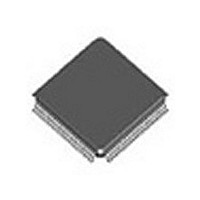82V1074PF IDT, Integrated Device Technology Inc, 82V1074PF Datasheet - Page 60

82V1074PF
Manufacturer Part Number
82V1074PF
Description
Manufacturer
IDT, Integrated Device Technology Inc
Datasheet
1.82V1074PF.pdf
(107 pages)
Specifications of 82V1074PF
Number Of Channels
4
On-hook Transmission
Yes
Polarity Reversal
Yes
On-chip Ring Relay Driver
Yes
Operating Supply Voltage (typ)
3.3V
Operating Temp Range
-40C to 85C
Package Type
TQFP
Operating Temperature Classification
Industrial
Pin Count
100
Mounting
Surface Mount
Operating Current
95mA
Operating Supply Voltage (max)
3.465V
Operating Supply Voltage (min)
3.135V
Lead Free Status / RoHS Status
Not Compliant
'00000' now, the CODEC will stop counting down and the addressing
operation is finished.
b[4:0]+1. Hence, up to 32(d) local registers can be addressed by one
local command. To apply a write local command, total b[4:0]+1 bytes of
data should follow to ensure proper operation. See
Table - 21 Local Register Addressing in MPI Mode
first byte present on the CI pin as command and the following byte(s) as
data. To execute other commands, the CS pin must be changed from
low to high to finish the previous command and then be changed from
high to low to start the next command.
at any time. If the CS pin changes from low to high during a addressing
process, the operation for current local register and the rest local
registers will be aborted. But the operations accomplished before the CS
pin goes high will have already been executed.
must remain low for more than one data byte period after the last
data byte is transmitted.
MPI” on page 83
Address Specified in
RSLIC & CODEC CHIPSET
a Local Command
The number of the local registers addressed by a local command is
In MPI mode, when the CS pin is pulled low, the CODEC treats the
The automatic count-down procedure can be stopped by the CS pin
To complete an automatic countdown procedure, the CS pin
Refer to
• GCI Mode
In GCI mode, the b4 bit in the Program Start byte, together with the
b[4:0] = 11000
b[4:0] = 10110
b[4:0] = 10101
b[4:0] = 10000
b[4:0] = 01101
b[4:0] = 01000
b[4:0] = 00110
b[4:0] = 00101
b[4:0] = 00000
b[4:0] = 11110
b[4:0] = 11101
b[4:0] = 10111
b[4:0] = 01111
b[4:0] = 01110
b[4:0] = 00111
b[4:0] = 11111
...
...
...
...
“5.4.1.1 Example of Programming the Local Registers via
for more information.
In/Out Data Bytes
32 bytes
31 bytes
30 bytes
25 bytes
24 bytes
23 bytes
22 bytes
17 bytes
16 bytes
15 bytes
14 bytes
9 bytes
8 bytes
7 bytes
6 bytes
1 byte
...
...
...
...
Registers to be accessed
from ‘10101’ to ‘00000’
from ‘10000’ to ‘00000’
from ‘01000’ to ‘00000’
from ‘00101’ to ‘00000’
Address of the Local
from ‘11110’ to ‘00000’
from ‘11101’ to ‘00000’
from ‘11000’ to ‘00000’
from ‘10111’ to ‘00000’
from ‘10110’ to ‘00000’
from ‘01111’ to ‘00000’
from ‘01110’ to ‘00000’
from ‘01101’ to ‘00000’
from ‘00111’ to ‘00000’
from ‘00110’ to ‘00000’
from ‘11111’ to ‘00000’
Table - 21
‘00000’
...
...
...
...
for details.
60
location of the time slot (determined by the S0 and S1 pin), specifies the
local registers to be addressed.
addressing method for reading and writing local registers. According to
the value of b[1:0] specified in the local command, there will be one to
four adjacent local registers to be addressed automatically with the
highest order one first. For example, if the address bits b[4:0] are set to
'XXX11' in a local command, the CODEC will count down from the
address 'XXX11' to the address 'XXX00' automatically. The number of
local registers to be addressed by one local command is b[1:0]+1.
Therefore, up to four local registers can be addressed by one local
command in GCI mode. Refer to
Table - 22 Local Register Addressing in GCI Mode
can not be stopped once a command is initiated. For a write operation,
the number of the data bytes that follow the command byte must be the
same as the number of the registers to be written.
GCI” on page 85
5.2.3
configure all four channels. The CODEC provides 32 global registers for
all channels. The global registers are accessed by the corresponding
global commands.
and there is no need to specify a channel or channels before addressing
global registers. Except for this, the global registers are addressed in a
similar manner as the local registers. See
Programming the Global Registers via MPI” on page 84
the GCI time slots and all four channel will receive it. Except for this, the
global registers are addressed in a similar manner as the local registers.
See
page 85
5.2.4
Address Specified in
a Local Command
In GCI mode, the CODEC provides a consecutive adjacent
In GCI mode, the procedure of the consecutive adjacent addressing
Refer to
In both MPI and GCI modes, the global registers are used to
• MPI Mode
In MPI mode, the global registers are shared by all four channels,
• GCI Mode
In GCI mode, the global command can be transferred during any of
When sending a Caller ID message via FSK signal, the message
b[4:0] = XXX10
b[4:0] = XXX01
b[4:0] = XXX00
b[4:0] = XXX11
“5.4.2.2 Example of Programming the Global Registers via GCI” on
for details.
“5.4.2.1 Example of Programming the Local Registers via
ADDRESSING THE GLOBAL REGISTERS
ADDRESSING THE FSK-RAM
for details.
In/Out Data Bytes
IDT82V1671/IDT82V1671A, IDT82V1074
byte 1
byte 2
byte 3
byte 4
byte 1
byte 2
byte 3
byte 1
byte 2
byte 1
Table - 22
for details.
Registers to be accessed
Address of the Local
“5.4.1.2 Example of
XXX10
XXX01
XXX00
XXX10
XXX01
XXX00
XXX01
XXX00
XXX00
XXX11
for details.















